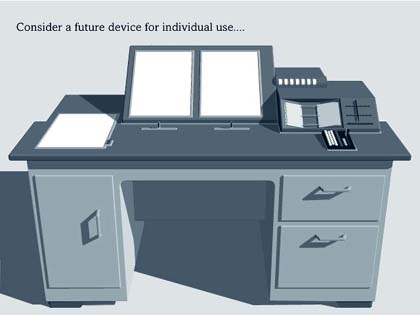The Evolution of Personal Knowledge Management

July 1945 The difficulty seems to be, not so much that we publish unduly in view of the extent and variety of present day interests, but rather that publication has been extended far beyond our present ability to make real use of the record. The summation of human experience is being expanded at a prodigious rate, and the means we use for threading through the consequent maze to the momentarily important item is the same as was used in the days of square-rigged ships. -- As We May Think by Vannevar Bush, Atlantic Monthly, July 1945
February 2000 What's more ironic is this: As the Web has made the idea of cross-linked, cross-indexed information commonplace, the tools we provide end-users to cross-link and cross-index personal information have become worse. -- Still in mourning for my personal information manager - now extinct by Bob Lewis, Infoworld
August 2003 Here, for me, is the secret promise of blogs. They lower the barriers and make the practice of writing widely accessible. Writing is the fundamental tool of reasoned argument and what we need as individuals, organizations, and civilization is as much reasoned argument as we can get. In the blogosphere you get to watch good writers at work as they develop ideas. Thanks to aggregators those ideas appear in a form that makes them natural raw material to kindle your own thinking. The combination of blog technical features (public distribution, short posts, chronological ordering, permalinks) with social practices (personal identification, generous linking, blogrolls) highlight the development of ideas as a social phenomenon over time. -- My secret hope for blogs, Jim McGee
October 2005 Millions of human eyes and their agents constantly scan and evaluate items posted to the public Web using Web search, notification, and social tagging engines to focus on a particular topic. When a person finds a “momentarily important item” [Bush (1945, p. 1)] by directed search or serendipity, it's simple to post a note and link to that item on their weblog. If the item is of genuine interest, the weblog post will be discovered and discussed by others, a social process that amplifies a weak signal and can add collaborative information -- Use of Weblogs for Competitive Intelligence, Greg Lloyd
Notes
Four jump cuts spanning 60 years! I put this together while thinking about the SIIA Brown Bag panel Personal Knowledge Management: Building Actionable Content from Collaborative Publishing.
For my favorite hypertext historical references, see : Use of Weblogs for Competitive Intelligence | First International Business, Technology CI Conference, Tokyo Oct 2005. If you only want the reference list (with live links where I could find them), see BTCI Oct 2005 Abstract and References.
A special favorite is the excellent 2004 PhD thesis: Lost In The Archive: Vision, Artefact And Loss In The Evolution Of Hypertext by Belinda Barnet, University of New South Wales. In her introduction, Barnet says:
"This thesis presents an argument for a new model of technical evolution, a model which claims that technics constitutes its own dynamic, and that this dynamic exceeds human evolution. It traces the genealogy of hypertext as a set of techniques and as series of material artifacts. To create this geneaology I draw on interviews conducted with Douglas Engelbart, Ted Nelson and Andries van Dam, as well as a wide variety of primary and secondary resources."
The analysis is unique and compelling; the thesis is very well researched and fascinating to read. The first person interviews with Doug Engelbart, Ted Nelson, and Andy van Dam by themselves make it an exceptional historic record.
 I18N ERROR: @tsiskin#footer_RSS_Feed
I18N ERROR: @tsiskin#footer_RSS_Feed